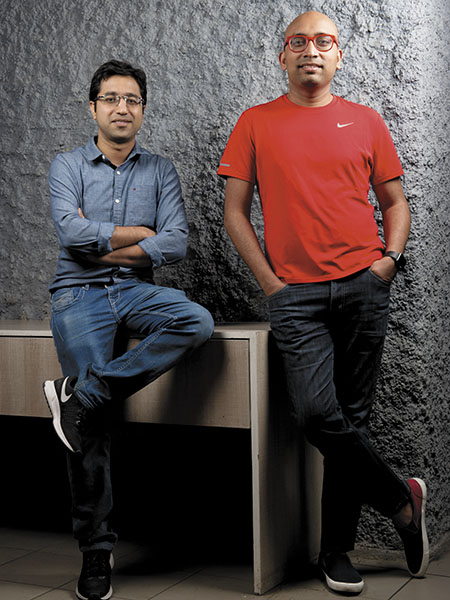BUSINESS
Lizzie Chapman: Pioneering Buy Now Pay Later in India’s Fintech Revolution

Lizzie Chapman‘s journey from a childhood filled with Hindi movies in London to becoming the CEO of ZestMoney, a Bengaluru-based startup pioneering Buy Now Pay Later (BNPL) in India, is an inspiring tale of perseverance and seizing opportunities. Growing up in London to working-class parents, Chapman was captivated by Indian culture, thanks to her mother’s association with the Red Cross in India. Weekends in her South Asian-dense neighborhood were often spent watching back-to-back Hindi movies, a passion that even her husband, a South Mumbai native, hadn’t matched. Her deep-rooted connection with India and belief in its potential led her to take a bold step.
Chapman’s remarkable journey began a decade ago when she decided to move to India, even though many of her colleagues weren’t ready to take the leap into the budding Indian fintech landscape. Her fascination with India’s potential as it stood on the brink of a significant economic explosion was her driving force. “I was really fascinated and excited about the potential for what could happen in India,” Chapman says. “Many of my friends say that I took one of the biggest macro bets of all of us. While many were only talking, I packed my bags and came here.”
Chapman’s path to the world of finance and money was born out of her personal struggles with financial constraints. “I grew up with no money, I got quite fascinated by money at university and particularly trading,” she recalls. Despite coming from a family with no stock ownership experience, she recognized the potential of money and investment even with small amounts. This fascination with trading led her to Goldman Sachs, where she started as an associate. Afterward, she joined the Wellcome Trust, a charitable organization, before taking the leap to move to India. In 2011, she joined Wonga, a British digital lending company, and relocated to India. At that time, fintech in India was still in its nascent stage, and many didn’t take it seriously. However, it was a pivotal move as it set the stage for her future endeavors.
Despite the eventual closure of Wonga, Chapman’s fintech journey was far from over. In 2015, Chapman co-founded ZestMoney, recognizing the credit gap in the Indian market. The company aimed to provide access to funds to individuals without credit cards or formal financing options due to limited credit history. This was the time when fintech in India was just starting to gain traction. Chapman and her team identified the pressing issue of limited access to credit for many individuals. They recognized the potential in the BNPL market and decided to focus 99 percent of their efforts on this segment. The demonetization of high-value currency in India, along with the government’s push for digitization, created a favorable environment for ZestMoney’s expansion. The company has raised approximately $120 million from investors, including notable names like Goldman Sachs, Omidyar Network, and Naspers.
ZestMoney allows customers to defer payments for products ranging from ₹50 to ₹5 lakh, covering around 10,000 online sites and 75,000 physical stores across India. While the BNPL segment in India is becoming increasingly crowded, ZestMoney’s focus on customer acquisition through merchants has given them a competitive edge. This approach ensures that ZestMoney understands its customers and their purchasing behaviours. As per Redseer, India’s BNPL market is projected to grow to $45-50 billion by 2026, up from $3-3.5 billion currently. The number of users is expected to surge to 80-100 million customers by 2026, from the current 10-15 million.
While ZestMoney has successfully entered the BNPL segment in India, Chapman anticipates intensified competition as more players venture into this space. However, her unique perspective and understanding of the Indian market have allowed her to make a significant impact, especially among millennial and Gen-Z consumers. Srinath Sridharan, an expert in the banking and financial services industry, acknowledges Lizzie’s achievements and ability to build a distinct product that appeals to the younger demographic. He believes that Lizzie’s foreign perspective has enabled her to successfully crack the market.
BUSINESS
Empowering Women in Dubai’s Real Estate Market: The Vision and Journey of Leedwells Real Estate and Boon Stay

In the dynamic and competitive real estate market of Dubai, where male dominance has traditionally been the norm, a new wave of female empowerment is making significant strides. Among the frontrunners of this movement is Leedwells Real Estate, a company established in 2021 with a mission to revolutionize the property market. Recently, in 2024, they expanded their vision with the launch of Boon Stay, a company dedicated to the holiday home concept. Together, these sister companies are committed to fostering a more inclusive and diverse industry.
Leedwells Real Estate: A Clear Vision for Real Estate
Founded in 2021, Leedwells Real Estate has consistently demonstrated excellence in the property market, leveraging over 12 years of industry experience. Led by CEO Aman Kaur and Managing Director Arshe Noor, Leedwells Real Estate has solidified its reputation as a reliable and innovative real estate agency in Dubai. Their dedication to client satisfaction and market expertise ensures that clients receive personalized services tailored to their unique needs.
Championing Women Empowerment
In an industry largely dominated by male professionals, Leedwells Real Estate stands out for its commitment to empowering women. Aman Kaur and Arshe Noor recognize the success and contributions of numerous female professionals in the real estate sector. By promoting diversity and inclusion, they aim to pave the way for more women to achieve remarkable milestones in their careers.
Expanding Horizons: Boon Stay
Building on the success of Leedwells Real Estate, Aman Kaur and Arshe Noor launched Boon Stay in 2024 to address the growing demand for holiday homes in Dubai. Recognizing the city as a global travel hub, Boon Stay offers a comprehensive platform where travelers can find luxurious accommodations and curated experiences. The company’s approach mirrors popular services like Airbnb, but with a distinctive focus on luxury and personalized service.
Boon Stay’s unique business model not only caters to holidaymakers but also serves investors looking to capitalize on Dubai’s lucrative real estate market. The company offers comprehensive investment opportunities, enabling clients to generate substantial revenue through strategic property investments. This dual approach of catering to both travelers and investors sets Boon Stay apart in the competitive landscape.
A Holistic Experience
For visitors to Dubai, Boon Stay promises a seamless and luxurious experience. From arranging premium accommodations to organizing bespoke luxury trips, the company ensures that every aspect of the client’s stay is meticulously handled. This all-encompassing service guarantees a memorable and stress-free holiday, allowing guests to fully immerse themselves in the vibrant culture and opulence of Dubai.
Future Prospects
As Leedwells Real Estate and Boon Stay continue to expand, their vision remains clear: to create a more diverse, inclusive, and successful real estate market in Dubai. By empowering women and providing unparalleled services to both travelers and investors, these companies are set to redefine industry standards and contribute to Dubai’s reputation as a premier destination for real estate and luxury living.
In conclusion, Leedwells Real Estate and Boon Stay exemplify the transformative power of diversity and innovation in Dubai’s real estate market. Through the unwavering commitment of Aman Kaur and Arshe Noor to excellence and empowerment, they are not only achieving remarkable growth but also inspiring a new generation of female leaders in the industry.
Entrepreneurs
The WittyFeed Triumph: Vinay Singhal, Parveen Singhal, and Shashank Vaishnav’s Journey to Content Dominance

Vinay Singhal, Parveen Singhal, and Shashank Vaishnav have created a stunning success story with WittyFeed in the digital world, where content is king. Rising from the ashes of failed businesses, these computer experts changed course and built the second-largest content platform globally, only surpassed by BuzzFeed. This piece explores the story of these visionary founders and how WittyFeed rose to prominence in the content industry.
In 2013, faced with the setbacks of two unsuccessful ventures, Vinay, Parveen, and Shashank decided to stay the course. Ditching Evrystry.com and FollowMe247, they envisioned a content platform that catered to the needs of content creators, distributors, and consumers. This vision materialized in September 2014 with the launch of WittyFeed—a platform that rapidly ascended the ranks to become the third-most visited website in the Indian entertainment category.
For Vinay Singhal, WittyFeed is not just a content platform; it’s a technology play. Leveraging robust technology and analytics, WittyFeed ensures its content goes viral by intricately guiding content selection, creation, distribution, and monetization. Real-time data analysis and insights into user behavior empower thousands of influencers to disseminate content, making WittyFeed a formidable player in the global content arena.
WittyFeed’s strategic foresight extends to its strong network of influencers, positioning the platform years ahead of its competitors. Recognizing influencers as the distributors in the digital world, WittyFeed created Viral9.com—an influencer platform with around 15,000 influencers. These influencers, with millions of followers, redirect traffic to WittyFeed, creating a symbiotic relationship that propels the platform’s reach.
WittyFeed’s impact transcends borders, with a presence in Spain, the US, and the UK, while rapidly gaining traction in India. The platform boasts over 100 million sessions and 60 million unique visitors monthly, generating revenues of ₹30 crore in FY17. Programmatic advertising forms a significant revenue stream, complemented by sponsored content collaborations with around 70 brands, including Uber, Coca-Cola, and Zee Studios. By endearing itself to brands, WittyFeed aims to derive 40 percent of its revenues from brand partnerships.
While WittyFeed has thrived, the platform remains vigilant about potential challenges, especially as Facebook’s algorithms evolve. Vinay emphasizes the importance of steering clear of click-bait and focusing on quality content to maintain a symbiotic relationship with Facebook. Future strategies include the integration of video content, fostering collaborations with mobile apps, and seeking a series A funding round for expansion.
The success of WittyFeed lies in the synergy of its founders—Parveen Singhal, Vinay Singhal, and Shashank Vaishnav. Parveen, the Chief Content Officer, envisions video content as the next growth frontier. Vinay, with a knack for building solutions, steers the technology-driven aspects, while Shashank, the Chief Technology Officer, brings real-time data analytics to the forefront.
As WittyFeed charts a course toward greater heights, its founders remain attuned to the evolving nature of digital consumption. Vinay Singhal encapsulates the essence of their journey, emphasizing the imperative of staying at the forefront of change. The triumvirate’s journey from the brink of failure to commanding one of the world’s largest content platforms is not just a success story; it’s a testament to resilience, innovation, and the power of strategic vision. In an ever-evolving digital landscape, WittyFeed and its founders stand poised for continued impact and influence.
Entrepreneurs
Rahul Narang and Saurabh Arora: Architects of Healthcare Transformation at Lybrate

Rahul Narang and Saurabh Arora‘s combined genius is evident in the rapidly changing field of healthcare innovation as they lead Lybrate, a ground-breaking online platform for medical consultations. The story takes place against the backdrop of Saurabh Arora, who attended Columbia Business School and IIT Delhi before purposefully changing his course. 2014 saw Arora leave his position as a data scientist at Facebook in Silicon Valley in order to pursue his homegrown business goals. This crucial choice launched Lybrate in 2015, a platform that has the potential to completely transform patient-doctor relations.
Arora’s vision for Lybrate germinated during a visit to India, where he keenly observed the challenges posed by self-medication in rural areas and the inconveniences faced by urban denizens. Fueled by a determination to bridge these gaps, Arora enlisted the expertise of his former colleague and friend, Rahul Narang, who assumed the role of co-founder and chief technology officer at Lybrate.
The platform, operating as an online out-patient department (OPD), strategically deploys technology to enhance the accessibility of quality healthcare across India. Arora’s mission was to seamlessly connect patients and doctors, transcending geographical constraints. In less than three years, Lybrate has garnered over 1 lakh registered doctors, facilitating upwards of 6 million interactions monthly. These interactions span doctor searches, health queries, and appointments for consultations and lab tests.
The triumph of Lybrate can be attributed to its innovative approach and meticulous planning. Arora underscores the critical importance of aligning the product with the workflow of doctors, fostering positive word-of-mouth recommendations. The nascent stages involved securing funding, with Gokul Rajaram, a luminary in developing Google’s AdSense network, playing a pivotal role. Lybrate secured a seed round of $1.23 million from Nexus Venture Partners, Rajaram, and independent investor Vispi Daver in August 2014. A subsequent funding round in July 2015 saw a commitment of $10.2 million from Tiger Global, Nexus Venture Partners, and Ratan Tata, propelling Lybrate’s mission to new heights.
The healthcare landscape in India presents a formidable challenge, marked by a concerning doctor-patient ratio of 1:1,700, as highlighted by a joint report from KPMG and Ficci. What sets Lybrate apart is its unwavering focus on alleviating the doctor shortage. The platform’s workflow begins with anonymous health-related queries from patients, evolving into online or offline consultations as comfort levels with the doctors on the platform grow.
Lybrate’s distinctive patient engagement model places the patient at the center, offering access to a comprehensive spectrum of healthcare services. This strategic differentiator positions Lybrate favorably against Practo, its major competitor, which primarily functions as a doctor discovery platform. While Practo concentrates on appointment scheduling, Lybrate is committed to transforming the patient-doctor interaction and propelling it into the digital realm.
Despite the myriad challenges, Lybrate has achieved a commendable turnover of over ₹22.45 crore in FY15-16, with aspirations to reach ₹25 crore in the current fiscal year. The platform boasts various revenue streams, including ‘Lybrate Consult,’ allowing users to consult preferred doctors for a fee. ‘Lybrate Lab+’ and ‘Lybrate Cube’ contribute significantly to the company’s revenue by facilitating lab tests and providing tools for doctors to enhance their online presence.
As the health tech industry witnesses an influx of competitors, Lybrate’s early entry into the fray positions it as a frontrunner. However, challenges persist, and success in this dynamic landscape hinges on delivering a substantial value proposition for both patients and doctors. The journey of Rahul Narang and Saurabh Arora with Lybrate symbolizes a commitment to quality and innovation, marking the advent of a new era in online healthcare solutions.
-

 ENTERTAINMENT4 years ago
ENTERTAINMENT4 years agoBaahubali: The Beginning completes five years, Tamannaah Bhatia shares video
-

 ARTIST3 years ago
ARTIST3 years agoIndia’s famous Rock Kirtan Band, Madhavas Rock Band
-

 ENTERTAINMENT4 years ago
ENTERTAINMENT4 years agoTrouble of 58 year old Sunil Shetty, I am not young, I am not old
-

 LATEST UPDATES4 years ago
LATEST UPDATES4 years agoTwist in serial Anupama will come soon, these three stars will be entered in the show
-

 ENTERTAINMENT4 years ago
ENTERTAINMENT4 years agoMeet Purav Jha The Viral Sensation
-

 ARTIST3 years ago
ARTIST3 years agoFemale Entrepreneur & Adult Film Star Sky Black Shares Her Story of Success!
-

 LATEST UPDATES4 years ago
LATEST UPDATES4 years agoCBSE 12th Topper List Jharkhand: State Topper of Ranchi, Adyasha Top in Bokaro, see Toppers List here
-

 ENTERTAINMENT4 years ago
ENTERTAINMENT4 years agoPiya Albela fame Sheen-Akshay coming again, will be seen in this serial












